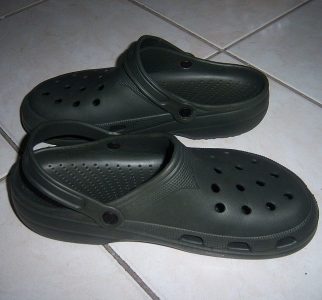 Crocs have become a very popular footwear option, especially in the summertime, but can these spongy shoes actually cause problems for your feet? We always preach that a shoe should be comfortable, and while Crocs they may be just that, comfort is just part of the equation. Below, we take a closer look at Crocs and explain how to avoid foot problems if you own a pair.
Crocs have become a very popular footwear option, especially in the summertime, but can these spongy shoes actually cause problems for your feet? We always preach that a shoe should be comfortable, and while Crocs they may be just that, comfort is just part of the equation. Below, we take a closer look at Crocs and explain how to avoid foot problems if you own a pair.
Crocs And Foot Pain
Crocs are comfortable and lightweight, but that doesn’t mean that they are a perfect option for your feet. Similar to high heels, their design can leave you susceptible to a variety of foot injuries. Here’s how:
Lack of Support – While they may be comfortable, Crocs are far from the most supportive type of shoe. They provide very little support to your ankle and your arches, which can lead to soft tissue injuries. If your foot isn’t supported in the midfoot area, you’ll be at an increased risk for plantar fasciitis.
No Heel Support – Crocs can be worn backless, and even when the back strap is engaged, they offer very little support for your heel. When people present to our office with heel pain or Achilles tendonitis, we often ask about their footwear choices, and ti’s not surprising to learn that they wear Crocs frequently. Your heels need support from the shoe when walking, and they don’t get that from Crocs.
Sweaty Feet – Crocs and socks is viewed as a fashion faux pas, which means most people simply slip their barefoot into their Crocs. If you have sweaty feet, this can lead to moisture-related issues since the moisture is not wicked away into the shoe or a sock.
Falls – Many people say that Crocs are comfortable because of their wide fit, but that also makes the footwear a significant trip and fall risk. Your Crocs likely have a much looser fit than your normal pair of shoes, and that can greatly increase your risk of a fall.
If you’re going to wear Crocs, do so carefully. If you’re going to be walking a lot, opt for a more supportive shoe, otherwise your dogs will be barking at the end of the day. They are great for walking down to the beach or wearing to go outside and grab the mail, but don’t make them your everyday shoe. Crocs simply do not provide enough support for your feet, and while you can get by with this lack of support in short intervals, putting your feet in unsupportive shoes for extended periods can greatly increase your risk of all the issues we mentioned above.